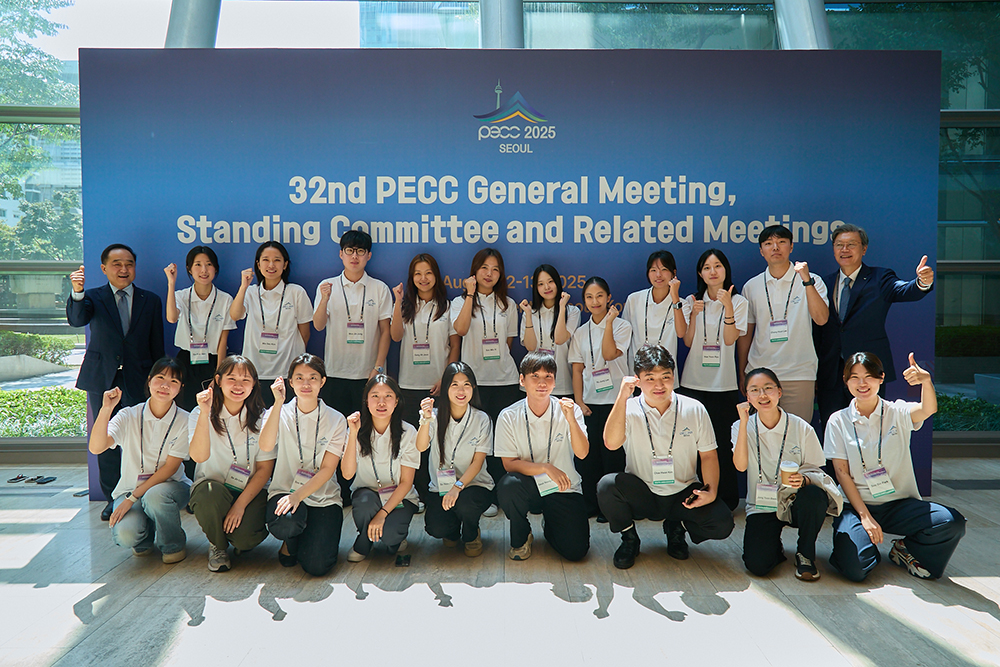By Mia Mikic (NZPECC)
Promoting Youth Engagement in PECC: Building the Next Generation of Regional Leaders
Engaging young people in regional cooperation is not just about preparing the next generation—it is also about enriching today’s policy discussions with fresh perspectives, creativity, and energy. As the Asia-Pacific confronts profound structural changes—digital transformation, climate challenges, demographic shifts, and evolving trade patterns—there is increasing recognition that youth must be part of the dialogue. Within the Pacific Economic Cooperation Council (PECC), youth engagement is gaining momentum as a way to sustain regional cooperation into the future.
A recent example comes from the 32nd PECC General Meeting and the accompanying conference on “Reimagining Asia-Pacific Cooperation: Trade, AI, and Demographics in a Shifting Global Landscape”, hosted by the Korea National Committee for PECC (KOPEC) in August 2025. There, I had the opportunity to interact directly with the Korea PECC Youth Ambassadors, whose work this year was especially impressive.
A total of 20 university students with a strong interest in international cooperation issues took part in the program. Divided into four teams, they focused on two themes—Artificial Intelligence (AI) and Demographic Change—and engaged in preparatory learning before attending the meetings. As part of their activities, they observed the General Meeting and Standing Committee sessions firsthand, conducted interviews with key speakers, and created digital content such as card news and on-site sketches to promote the program’s objectives.

The highlight came when two teams were selected to present at the Standing Committee meeting on 13 August 2025. The AGEnda team addressed “Intergenerational Cooperation for Responding to Demographic Change,” while the VOYCE team presented on “Job Creation Strategies in the AI Era.” Their presentations generated significant interest and positive responses from Standing Committee members, who praised the students’ keen awareness of pressing issues and their creative approaches. Several members underlined the importance of expanding youth participation in international cooperation and encouraged KOPEC to continue such initiatives under the PECC framework.
“Twenty Youth Ambassadors presented their views on AI and demographic change directly to the PECC Standing Committee—an unprecedented step in bringing youth voices into regional cooperation.”
Another example of successful engagement is the Hong Kong Committee for Pacific Economic Cooperation (HKCPEC) Youth Programme, which has long provided opportunities for young people to participate in seminars, internships, and research activities linked to Asia-Pacific cooperation. At the Standing Committee meeting, several PECC members expressed interest in collaborating with Hong Kong’s initiatives—whether through an inter-PECC youth program or other forms of cooperation—to broaden the reach and impact of such efforts.
These experiences show how national committees can play an important role in cultivating youth participation, and how collaboration across the network could multiply the benefits. Structured programs not only give young people a chance to contribute ideas but also ensure continuity of knowledge and commitment within PECC across generations.
Looking forward, there is scope to systematically integrate youth voices into PECC’s and APEC’s work. Today’s young people are already experimenting with new technologies, business models, and social approaches that can help address the pressing challenges of the region—whether digital trade, sustainable growth, resilient supply chains, or demographic transitions. Providing them with opportunities to engage with policymakers and experts will help bridge the gap between innovation on the ground and regional policy development.
As we look toward PECC’s future, investing in youth engagement is not optional; it is a necessity. The initiatives in Korea and Hong Kong offer strong examples that others in the PECC family could emulate. By working together, we can build a network of young leaders who are not only aware of the issues at stake but also equipped to carry forward the vision of regional cooperation in the Asia-Pacific.

